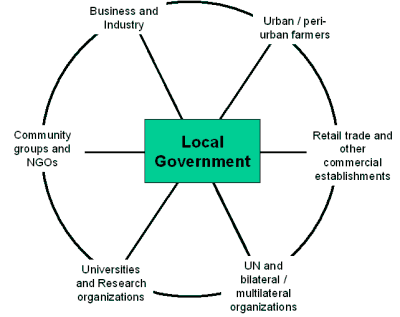
Info Sheets |
-
Upscaling Waste Action
through Stakeholder PartnershipsHari Srinivas
Effective management of waste requires comprehensive understanding along the entire waste continuum ・ranging from waste disposal to waste recycling and processing, and to waste minimization.
It was traditional to expect that the local government and its various agencies and departments was entirely responsible for all activities and action related to waste management. It is now becoming increasingly apparent that the complexity of managing waste necessitates a shift from end-of-pipe approach ・of waste 壇isposal・to a more life-cycle and at-source approach ・of waste minimization and reduce-reuse-recycle.
Along with this broader understanding of the waste 祖ontinuum・is the need for upscaling of waste to link to and include other environmental initiatives being undertaken at the local level. Managing waste requires action at all stages of production and consumption, and hence needs to be integrated and included in other environmental initiatives. These include, for example, water management, Local Agenda 21, laws, rules and regulations, LCA, EMS, ISO 14001 etc.

Market mechanisms such as financing/subsidies, environmentally sound technologies, new products using waste materials, easy-of-entry and other incentives need to be put in place for better waste management. Proper waste disposal using appropriate technologies and plant design help in reducing CO2 emissions, and assist in meeting goals and objectives under, for example, Kyoto Protocol. The Clean Development Mechanism can also be a powerful initiative for better waste management.
Parallel to this are efforts that require the active participation of a range of stakeholders providing different inputs and taking different actions in order to manage waste along the continuum.

These include community groups and NGOs, retail and commercial establishments, urban and peri-urban farmers, business and industry, universities and research institutes, UN and bilateral/multilateral organizations, etc. Each of these stakeholders provide different inputs in the spheres of (1) governance and management, (2) education and awareness building, and (3) soft and hard technology options and capacities.
| Return to Urban Waste Contact: Hari Srinivas - hsrinivas@gdrc.org |